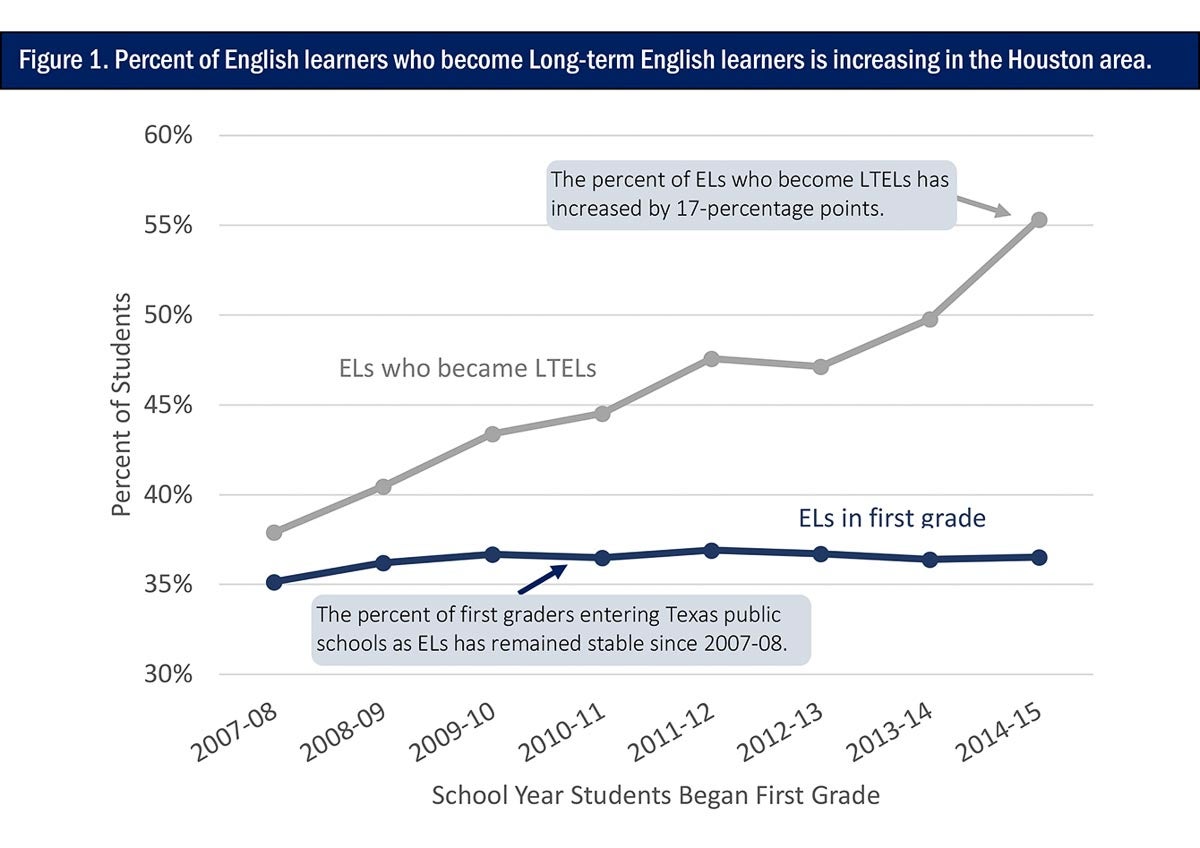English learners (ELs) are students who do not yet have the language skills needed to participate in an English-only classroom. The longer an EL student takes to “reclassify” — become proficient enough in English to participate in English-only instruction — the poorer their academic outcomes. If they do not reclassify within five years, students are considered long-term English learners (LTELs).
In the Greater Houston area, defined here as 27 school districts serving Harris and surrounding counties, ELs make up a quarter of all K-12 students and nearly a third of students starting elementary school. Recent data show that, since 2007, the percent of ELs becoming LTELs has increased by 50% in the Greater Houston area.
Reclassification is a critical milestone for EL students
Reclassification is a critical educational milestone because, until they reclassify, ELs do not have access to schools’ full range of educational programs. For most schools and districts, the expectation is for ELs to reclassify in elementary school, and students who do reclassify in these early years tend to go on to achieve academic success on par with, and in some cases outperform, their never-EL peers.
In contrast, ELs who take longer to reclassify tend to struggle in school, meaning they tend to have lower grades and score lower on state and national tests. Of more concern is the fact that taking longer to reclassify places students at a higher risk of dropping out of high school and reduces their likelihood of going to college by more than half.
Fewer EL students are reclassifying before middle school
The number and percent of ELs becoming LTELs has increased significantly in the past 10 years in the Houston area. During the 2007-08 school year, about 27,000 students who started first grade in the region were classified as ELs. Five years later, roughly 25,200 of those students who were still in public schools, and of those, nearly 16,000 had reclassified as Els, while around 9,600 — about 38% — were considered LTELs.
Looking at the same information for students who entered first grade during the 2014-15 school year, about 31,600 were EL students. Five years later, in their schooling, about 29,700 of those students who were still in public schools, only 13,300 had reclassified, and more than 16,400 students were still EL — in other words, 55.3% were LTELs (Figure 1). Not only do we see an increase in the number and percent of ELs becoming LTELs, we also see a decrease in the number of ELs who are being reclassified, despite an increase in the total number of ELs in schools.

Source: Houston Education Research Consortium
What is contributing to these trends?
There are several potential reasons why more ELs are taking longer to reclassify. First, it could be a matter of numbers — between 2007-08 and 2014-15, the number of students entering first grade as EL increased by 4,500. While this is a lot more students, proportionally it is minimal. ELs made up 35% of students in first grade in 2007-08 and 37% of students in first grade in 2014-15.
A second reason could be funding, particularly cuts to budgets due to shrinking revenue between 2007-2009 during the Great Recession. While budgets cuts might account for some of the initial uptick in the percent of ELs becoming LTELs, it is less clear why it would still matter for students entering schools nearly 10 years later. Changes to policies around EL students, including reclassification requirements, accountability standards and grade-retention practices could also play a role in shaping the proportions of ELs who become LTELs.
And one of the more salient factors potentially driving this trend of delayed reclassification is the prolonged and significant shortage of qualified bilingual teachers Texas schools have experienced over the past decade. For these reasons and more, further investigation is needed to truly understand the marked and alarming uptick in the share of ELs becoming LTELs.
What could this mean for EL students?
While further exploration is important to understanding factors contributing to the trends seen in EL students, waiting on the research is not an option, given what is already known about the challenging academic experiences and outcomes awaiting these students in middle school, high school and beyond.
The increased number and proportion of ELs not reclassifying by middle school means thousands more students are at an increased risk of leaving school before graduating now than in the past. The chances an EL student goes to college and earns all the benefits and increased lifetime earnings associated with that level of education get smaller and smaller. And without quick and decisive action to reverse these trends and associated outcomes, this pattern almost certainly ensures the perpetuation of inequalities and inequities for another generation.
Next steps
The numbers shared here focus only on the Greater Houston area, but a report from the Houston Education Research Consortium (HERC) that will be released in early April examines this pattern for all of Texas, including the state’s four other major urban areas. While the increase in the percent of ELs becoming LTELs in the Houston region is large, it is even larger elsewhere in the state. And, as the trend of more ELs becoming LTELs predates COVID-19, it is yet to be seen how the pandemic has exacerbated existing inequalities for these students.

